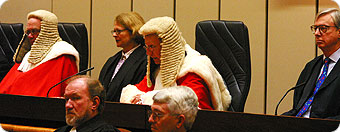 CIVIL APPEALS
CIVIL APPEALS
Waratah Coal P/L v Mitchell & Anor [2010] QCA 264 McMurdo P, Fraser and Chesterman JJA 1/10/2010
General Civil Appeal from the Supreme Court, Trial Division — Administrative Law — Judicial Review — Grounds of Review — Applying Policy and Merits of Case — Waratah (the appellant) and Vale Coal Exploration Pty Ltd (the second respondent) lodged competing applications for exploration permits over the same blocks of land on the same day — The Minister had to determine which application took priority pursuant to s 134A Mineral Resources Act 1989 (Qld) (MRA) — The Minister delegated the duty of determining which permit should be given priority to the first respondent, a senior employee of the department — In accordance with departmental policy, a Technical Panel of three geoscientists employed by the department was appointed to consider the merits of the competing applications and advised the second respondent of their opinion that they favoured Swanbank’s (now Vale) application — The second respondent agreed, having made her own assessment of the application and of the Panel’s recommendation — Waratah was dissatisfied with the decision and sought an order for review pursuant to the Judicial Review Act 1991 (Qld) — The application was dismissed — On Appeal — On 7 March 2007 the Chief Executive Officer of Waratah, Mr Peter Lynch, emailed an officer of the department additional information that was germane to Waratah’s application — The Panel did not take this additional information into account and signed the recommendation on 1 March and 7 March 2007 — The question to be answered is whether the assessment of relative merits in s 134A(2) limits the inquiry to the material lodged by the applicants on the same day, or whether it extends to supplementary materials either delivered gratuitously by an applicant or in response to a request from departmental officers — Under s 133(1)(f) and s 134A(2) of the MRA the Minister is to decide the relative merits of applications for exploration permits lodged on the same day and at a prescribed office — Section 134(2) read in conjunction with s 133, plainly indicates that the subject matter of the comparison is the information in the application documents — There is no scope for including additional information in the application documents, with the possible exception of that requested by the Minister pursuant to a departmental policy — The plain meaning of s 134A(2) is that the Minister is to make a comparison of like with like — What is to be compared are the applications, as described by s 133, lodged on the same day — The information emailed by Mr Lynch on 7 March 2007 did not form part of Waratah’s application lodged on 1 November 2006 — The first respondent correctly ignored it, as did the Technical Panel — HELD: Appeal dismissed with costs.
 Arc Holdings (Aust) P/L v Riana P/L & Anor [2010] QCA 269 Fraser and Chesterman and White JJA 8/10/2010
Arc Holdings (Aust) P/L v Riana P/L & Anor [2010] QCA 269 Fraser and Chesterman and White JJA 8/10/2010
General Civil Appeal from the Supreme Court, Trial Division — Conveyancing — Statutory Obligations or Restrictions Relating to Contract for Sale — Protection of Purchasers — Obligations on Vendor: Disclosure, Warnings and Like Matters — Arc (the appellant) entered into a contract to buy a three hectare block of land at Merrimac from the first respondent (Riana) for five million dollars — The second respondent (Reppals) was Riana’s real estate agent — The date for settlement of the contract was 26 August 2005 — On that date Arc purported to terminate the contract pursuant to s 367 of the Property Agents and Motor Dealers Act 2000 (Qld) (PAMDA) on the ground that the contract did not have attached as the first or top sheet the warning statement required by s 366 of PAMDA — The Land was a single parcel of vacant land and it was not within s 17(2) so that it could only constitute “residential property” if, in terms of s 17(1)(b) it was “in a residential area” — The definition of “residential area” in s 17(4) directed attention to the applicable planning scheme at the time the contract was made, which was the Gold Coast City Council Planning Scheme 2003 version 1.0 — The Land occupied an area depicted in green on Planning Scheme Domain Maps — A legend related that colour to the “Private Open Space Domain” — The trial judge determined that Arc was not entitled to terminate the contract as s 266 of PAMDA did not apply in relation to the contract as the Land was not “residential property” and that Riana was therefore entitled to treat Arc’s purported termination as a breach of contract and to have the deposit forfeited — On Appeal — The expression of the purpose in s 363(b) of PAMDA makes it clear that the intention is to protect only those buyers who enter into “relevant contracts” — The definition of that term directs the reader to the definition of “residential property” in s 17(1), which in turn directs attention to the definition of “residential area” in s 17(4) — The description of “Private Open Space Domain” communicated insufficient information to determine whether those maps identified the Domain as being intended for residential purposes, and it was therefore legitimate to refer to the text of the Planning Scheme to elucidate that description of the purposes of the domain — A construction under which residential use must be indicated as the principal, primary, or predominant use goes too far in excluding a great many cases from PAMDA’s intended protection where the subject land is in fact intended to be used for a residence — Upon the proper construction of s 17(1)(b) a single parcel of vacant land is “residential property” if a planning scheme map identifies that land as an area in which residential use is the preferred primary use or one of the preferred dominant uses of the land — HELD: Appeal dismissed with costs.
 McClelland & Anor v Perpetual Trustee Co. Ltd [2010] QCA 281 Holmes and White JJA and Mullins J 15/10/2010
McClelland & Anor v Perpetual Trustee Co. Ltd [2010] QCA 281 Holmes and White JJA and Mullins J 15/10/2010
General Civil Appeal from the Supreme Court, Trial Division — Procedure — Costs — Appeals as to Costs — Wrong Exercise of Discretion — The respondent (Perpetual) was the mortgagee of the defendants’ (the Cowleys) property located at Helensvale — In the first half of 2009, Perpetual obtained default judgments against them for recovery of possession of the property on the basis that they had failed to make loan repayments, and, subsequently, an enforcement warrant for possession of the property — The appellants (Douglas Laing McClelland and Platinum Lawyers) were retained by the defendants — In June 2009 Mrs Cowley instructed Mr McLelland that payments had in fact been made and provided bank statements purportedly from Westpac and New England Credit Union to support her claim — A close examination of the statements, however, would have revealed that eight of the eleven entries purporting to show payments in that period could not be genuine, because the difference between the balance before each debit and that after it did not equal the debit’s amount — On 9 July 2009, the day that the Cowleys’ application to set aside the default judgment and enforcement warrant was set down for hearing, McClelland swore an affidavit exhibiting a proposed defence, in which he deposed, “I have been shown the bank statements of the Defendants…and say that all of those repayments have been made” — The default judgment and enforcement warrant were set aside — About a week later Mrs Cowley gave McClelland documents which she said were bank traces from Westpac, confirming that monthly payments had been credited to Perpetual’s account and a similar document from New England Credit Union — The Credit Union trace bore the signature “Sue Young” — McClelland queried Young and was informed that it was not her signature and the letterhead did not resemble the Credit Union’s — McClelland questioned Mrs Cowley about Ms Young’s response to which she informed him that Sue Young was a family friend who had provided the trace contrary to the Credit Union’s policies — Mrs Cowley had assured him that she had not been engaged in any fraudulent activity and (he subsequently deposed) he believed his instructions — At this point, McClelland, whose capacity for belief brings to mind the White Queen in Through the Looking Glass, reached the conclusion that his clients had been the victims of identity theft — On 26 October, Perpetual Trustee’s application proceeded before the primary judge — The Cowleys did not appear — The orders of 9 July 2009 were set aside on the basis of fraud and McClelland was directed to file an affidavit setting out in full the circumstances relating to the application — The learned judge held that McClelland and the firm, Platinum Lawyers, were responsible for the costs incurred by Perpetual Trustee from 7 September 2009 and ordered them to pay those costs on an indemnity basis “because of Mr McClelland’s obstinate and egregious refusal to comply with his duties to the court” — On Appeal — The power to order costs may be exercised against a practitioner where the Court is satisfied that there has been a serious dereliction in the performance of the practitioner’s duty to the court — McClelland did not apply any rational judgment to the information that he had, or take the necessary steps to remedy the results of his credulity and carelessness — Although the Cowleys had surrendered the property on 30 September 2009, Perpetual nonetheless sought the setting aside of the July 2009 orders and the consequent reinstatement of the order for possession and the enforcement warrant as a matter of prudence — To do so it had to make the application — An earlier withdrawal of Platinum Lawyers as solicitors would not have made it any easier for Perpetual Trustee to get the orders set aside, nor made the costs it incurred any less — HELD: Appeal allowed, Order for indemnity costs set aside and the respondent to pay the costs of the appeal.
 Johnson v Triple C Furniture & Electrical P/L [2010] QCA 282 Holmes, Chesterman and White JJA 15/10/2010
Johnson v Triple C Furniture & Electrical P/L [2010] QCA 282 Holmes, Chesterman and White JJA 15/10/2010
General Civil Appeal from the Supreme Court, Trial Division — Appeal and New Trial — Interference with Judge’s Findings of Fact — Functions of Appellate Court — Where Inferences of Fact Involved — Where Facts Not in Dispute — Insurance — Claims Generally — Refusal — Statutory Restrictions On — In October 1999 a Cessna carrying a pilot and two passengers, crashed on takeoff from a grazing property — The pilot, Peter Johnson, was killed instantly — The two passengers, one of whom was the pilot’s wife, were seriously injured — The aircraft was owned by the respondent (Triple C), whose only directors and shareholders were Mr and Mrs Johnson, both of whom were employed by the company — There was overwhelming evidence that the pilot was grossly careless in his control of the aircraft — The respondent (Triple C) did not dispute its liability to Mrs Johnson who was awarded $846,030 against it — The respondent had effected a policy of aviation insurance with the appellant (Rural & General Insurance Ltd) to protect it from claims such as Mrs Johnson — The appellant (Rural) declined to indemnify the respondent under the policy claiming that the circumstances of the crash fell within one of its exclusions — The primary judge gave judgment for the respondent against the appellant for the whole of Mr Johnson’s judgment against it, together with costs — On Appeal — Regulation 5.81 of the Civil Aviation Regulations 1988 made under the Civil Aviation Act 1988 (Cth) provided that “Private (aeroplane) pilot: regular flight reviews required…pilot must not fly an aeroplane as pilot in command if the pilot has not, within the period of 2 years immediately before the day of the proposed flight, satisfactorily completed an aeroplane flight review…the person conducting the review must make an entry in the pilot’s personal log book” — Regulation 5.51 provides for the keeping of log books by those licensed to fly aeroplanes — At the trial counsel for the respondent conceded that the respondent did not “know if (Mr Johnson) did the flight review within two years…” — The appellant was put to proof on the issue — There was no record of Mr Johnson having undertaking a flight review, in the relevant period, in his personal log book found in the Cessna — That there was no such record was not contested, but it must be said that the parties’ representatives at trial were alarmingly casual in their treatment of the rules of evidence and, in particular, the best evidence rule — The log book was not produced at trial — Photocopies of what were described as the “relevant entries” were retained by the Australian Transport Safety Bureau, but a desultory attempt to procure the photocopies was not persisted in — A Mr Ellis, who examined the log book at the crash site, gave evidence of the documents contents — No point was taken about this objectionable and wholly unsatisfactory manner of what was critical to the third party proceedings — The log book found in the aircraft contained records of flights flown by Mr Johnson between 12 December 1997 and 13 November 1998 — There was a record of a satisfactory flight review on 14 December 1996, but none after that date — Given that proof of a successful review be noted in the pilot’s personal log book and signed by the person conducting the review, the absence from the log book of such a notation was cogent evidence there had been no such review — It was in the respondent’s and Mrs Johnson’s interest to adduce evidence that there had been such a review — The only sensible inference from the available facts is that the log book found in Mr Johnson’s possession on the day of the crash was his current log book which he had had since December 1996 — The lack of an entry by an instructor who conducted a review in the period October 1997 and October 1999 is strongly inconsistent with having completed a review — Held that the appellant had shown that Mr Johnson flew the aircraft on 20 October 1999 without having in the two years immediately beforehand satisfactorily completed an aeroplane flight review — The policy did not offer indemnity in circumstances where the aircraft was flown by a pilot who had not satisfactorily completed a flight review within two years previous to the loss — Because Mr Johnson had not satisfactorily completed the flight review, the respondent’s claim for indemnity under the policy was excluded — The omission not to undergo the review could reasonably be regarded as being capable of contributing to the loss, because the loss was caused by pilot error, Mr Johnson had many faults as a pilot, the purpose of the flight review is to check for pilot faults and correct them and prevent an unskilful pilot from flying, and an astute instructor will detect faults even where the candidate tries to conceal them — Section 54 does not assist the respondent — HELD: Appeal allowed, Orders where the appellant was to indemnify the respondent against the plaintiff’s claim set aside and Costs.
 SBT v CAY & Anor [2010] QCA 289 Chief Justice, Fraser JA and Philippides J 22/10/2010
SBT v CAY & Anor [2010] QCA 289 Chief Justice, Fraser JA and Philippides J 22/10/2010
Miscellaneous Application from the District Court — Criminal Injuries Compensation — Amount and Conduct Affecting — The primary judge ordered the respondent to pay the Public Trustee of Queensland, on trust for the applicant who was then 10 years of age, the modest sum of $2,250 as compensation under s 24 of the Criminal Offence Victims Act 1995 (Qld) — It related to two counts of indecent dealing with the applicant when the applicant was five or six years old — The respondent touched the applicant’s penis and had the applicant touch the respondent’s penis, in the one incident — The respondent had pleaded guilty to those offences and also to sexual offences committed upon the applicant’s brother B, who at the time of the offending was two years older than the applicant — B also applied for compensation, and the judge awarded him $28,500 — The evidence before the judge comprised a five page memorandum from the applicant’s mother, setting out the effect of the offending on both her sons, a written report from Ms Boast, a psychologist, and oral evidence given by Ms Boast per telephone during the hearing — Her Honour was not satisfied that Ms Boast addressed in her report the relationship between the commission of the offences upon the applicant and the applicant’s subsequent condition — The judge was concerned that the adverse impacts on the applicant may have been referable to the treatment of him by B rather than the commission of the offences, such that the applicant was in the position of a “secondary victim” — On Appeal — One cannot ignore the psychologist’s acknowledgement in her oral evidence that she found it impossible to relate the impact on the applicant to the offending rather than the situation within the family, or the other way around — Because of that acknowledgement, it fell to the judge to do her best to examine the extent to which the applicant’s condition was brought about by the offending itself — Her Honour contrasted the limited albeit serious extent of the offending on the one hand, with the “greatly overshadowing” violence visited upon the applicant by his badly traumatised elder brother, leading to her Honour’s conclusion that “only a limited impact” on the applicant was attributable to the offending — Her Honour’s consequent factual conclusions were open, and she reached them by following a course which was plainly open to her — HELD: Application refused.
 CRIMINAL APPEALS
CRIMINAL APPEALS
R v Williamson [2010] QCA 277 Fraser and Chesterman JJA and Cullinane J 15/10/2010
Appeal against Conviction from the Supreme Court, Trial Division — Evidence — Judicial Discretion to Admit or Exclude Evidence — Evidence Unfair to Admit or Improperly Obtained — Generally — The appellant was convicted of unlawfully trafficking in and possessing dangerous drugs — On 17 March 2010, after an eight day trial, the appellant was found guilty on all counts except the last and sentenced to a head sentence of 13 years’ imprisonment — On Appeal — The appellant appeals his convictions on the basis that certain evidence was wrongly admitted — It concerned a conversation the appellant had with an off duty police officer at a hotel in Toowoomba, during which the appellant impliedly admitted involvement in and knowledge of the storage of drugs and cash at a storage shed complex — When the police officer left the hotel he returned to the police station and made electronic notes of the conversation — These notes formed the basis of his later written statement dated 8 June 2007 which was admitted into evidence — The trial judge had proceeded on the basis, consistent with the police officer’s evidence, that the appellant had been drinking and appeared to be affected by liquor — However, there was “no suggestion” the appellant’s level of intoxication impaired his ability to decide whether to volunteer information to the officer — On any account, the appellant was not so intoxicated such that his statements to the police officer were, to any extent, incoherent — The appellant sought out the police officer in a public place, knowing he was an off duty police officer, in what appears to have been an endeavour not to assist police but to provide or obtain information in order to assist himself and/or Mr Laurie (his “best mate” who was charged on the same indictment) — The trial judge thought it difficult to see how it would be unfair to the appellant to admit evidence volunteered in those circumstances — HELD: Appeal dismissed.
Atkinson v Gibson [2010] QCA 279 McMurdo P, Fraser JA and Mullins J 15/10/2010
Application for Leave to Appeal from the District Court (s 118 DCA) — Interference with Discretion or Finding of Judge — Other Cases — In November 2006 the applicant and two other police officers waited on McIvor Road at a place between Cooktown and the Hopevale Aboriginal Community — The police had stopped cars and detained people and vehicles there whilst conducting investigations under the Liquor Act 1992 (Qld) — There were substantial conflicts between the evidence of the police and the evidence of the defence witnesses about the events that followed — At the close of the prosecution case in the Magistrate’s Court the Magistrate held that the respondent, Mr Gibson, had no case to answer on a charge that he committed a public nuisance at Hopevale on 30 November 2006 and dismissed that charge — The particulars of the public nuisance offence were that at a specified time and place the respondent used offensive language and gestures and the respondent’s behaviour interfered with the applicant’s enjoyment as he found the respondent’s behaviour offensive — The ground upon which the Magistrate decided that there was no case to answer was that it was not open to find that the part of McIvor Road where the events occurred was at that time a “public place” — The Magistrate held that the effect of conduct of the police was that the place on the road where the events occurred had temporarily lost its public character — The Magistrate concluded that reasonable people would avoid that area and consider it not available “for their general use” — On Appeal — The definition of “public place” in the Summary Offences Act 2005 (Qld) applies when the place is either open to the public or used by the public — The place where the alleged offence occurred retained its public character throughout — Here there was no barrier to prevent members of the public hearing and seeing what the respondent said and did — The effect of the ruling is that in similar cases members of the public and police officers, who find themselves in similar situations may be denied the protection against interference with their use of public places which is the expressed object of Division 1 of Part 2 of Summary Offences Act 2005 (Qld) — In relation to the assault charge, the Magistrate found there was no danger of the applicant being actually hit and that there was neither actual contact nor any apparent present ability to actually apply force — As was submitted for the respondent, the prosecution particularised the alleged assault as an attempt to apply force, not as a threat — The applicant did not argue that there was any error in the primary judge’s decision that the prosecution had failed to prove any actual attempt by the respondent to strike the applicant as particularised — In view of the public expense that must have been incurred in the prosecution of the public nuisance charge to date and the acquittals on the more serious charges, the view is open that there should be no further hearing in the Magistrates Court — HELD: Leave granted, Set aside the orders made in the District Court and the Magistrates Court ruling that there was no case to answer and dismissing the charge that the respondent committed a public nuisance, Set aside the costs orders and Direct the parties to provide further submissions as to the appropriate consequential orders
 R v Desborough [2010] QCA 297 McMurdo P, Muir JA and White JA 25/10/2010
R v Desborough [2010] QCA 297 McMurdo P, Muir JA and White JA 25/10/2010
Sentence Application from the District Court — Appeal against Sentence — Grounds for Interference — Sentence Manifestly Excessive or Inadequate — Applicant pleaded guilty under s 134.2(1) Criminal Code Act 1995 (Cth) to obtaining a financial advantage by deception from the Commonwealth between 24 May 2001 and 6 September 2006 — On 26 July 2010, she was sentenced in the Gladstone District Court to two years imprisonment with release after six months upon giving security by recognizance in the sum of $3,000, conditioned that she be of good behaviour for three years — She was also ordered to repay the Commonwealth $41,096.22 — The prosecutor submitted that: “the Commonwealth believes the appropriate penalty is something like about a two year sentence with her to be released after three or four months. If she’d gone ahead with the disputed facts we probably would have been telling you five or six months” — The prosecutor put forward schedules of single judge District Court sentences to support his contention as to the appropriate sentence, repeating: “I can go on with a few others but realistically two years to serve three or four months is the submission that the Commonwealth would make” — His Honour noted that the prosecutor had handed up only single judge decisions and enquired whether there were relevant decisions from the Court of Appeal but the prosecutor was unable to oblige — The judge referred to her antecedents, her employment with the Council and that her nine year old son would be cared for by others if she was imprisoned — Her offending was based upon greed rather than need — For that reason, the judge did not propose to order her early release from imprisonment at the time submitted by the prosecutor — On Appeal — The judge sought, but was not provided with, relevant Court of Appeal decisions to assist him in the difficult task of sentencing Ms Desborough — It is regrettable counsel did not assist the judge in this respect — In fact, this Court had, but a few months earlier, given its decision in R v Newton [2010] QCA 101, which would have provided the assistance his Honour sought — The Commonwealth Director of Public Prosecutions appeared for the respondent in Newton so it is especially surprising that the prosecutor was unaware of it — It is regrettable that counsel at Ms Desborough’s sentence did not refer the primary judge to Newton — In my opinion, the sentencing remarks demonstrate that the failure to refer the primary judge to Newton resulted in his Honour not appreciating that this offending was not of the aggravated type as in Smith, Smith or Edwards (earlier Court of Appeal decisions reviewed by Atkinson J in Newton) — HELD: Application granted, Appeal against sentence allowed to the limited extent of setting aside that part of the sentence directing that the appellant be released after having served six months imprisonment, and instead directing that she be released after having served three months imprisonment, Sentence at first instance is otherwise confirmed.




 CIVIL APPEALS
CIVIL APPEALS  Arc Holdings (Aust) P/L v Riana P/L & Anor [2010] QCA 269 Fraser and Chesterman and White JJA 8/10/2010
Arc Holdings (Aust) P/L v Riana P/L & Anor [2010] QCA 269 Fraser and Chesterman and White JJA 8/10/2010 McClelland & Anor v Perpetual Trustee Co. Ltd [2010] QCA 281 Holmes and White JJA and Mullins J 15/10/2010
McClelland & Anor v Perpetual Trustee Co. Ltd [2010] QCA 281 Holmes and White JJA and Mullins J 15/10/2010 Johnson v Triple C Furniture & Electrical P/L [2010] QCA 282 Holmes, Chesterman and White JJA 15/10/2010
Johnson v Triple C Furniture & Electrical P/L [2010] QCA 282 Holmes, Chesterman and White JJA 15/10/2010 SBT v CAY & Anor [2010] QCA 289 Chief Justice, Fraser JA and Philippides J 22/10/2010
SBT v CAY & Anor [2010] QCA 289 Chief Justice, Fraser JA and Philippides J 22/10/2010 CRIMINAL APPEALS
CRIMINAL APPEALS  R v Desborough [2010] QCA 297 McMurdo P, Muir JA and White JA 25/10/2010
R v Desborough [2010] QCA 297 McMurdo P, Muir JA and White JA 25/10/2010